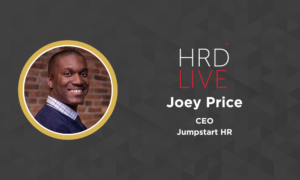Sony Music on compassionate leadership in 2020
- 7 Min Read
The need for a more considered approach to leadership has been felt for quite some time in business, but the events of 2020 have only compounded this. With the help of David Reay, International SVP, HR, Sony Music Entertainment, we took a closer look at how organizations can react.
- Author: Sam Alberti
- Date published: Aug 28, 2020
- Categories

If 2020 has taught us anything about business, it’s that things change. From talent strategies to culture initiatives to health and wellbeing, every core area undergoes fundamental shifts in order to align with the changing expectations of organizations and employees alike. Leadership is no exception to this this rule.
Just as the concept of a career no longer revolves around simply earning a living, the concept of leadership no longer revolves around simply delegating. It’s no secret that qualities such as compassion, mutual trust and a willingness to establish open dialogue are now highly valued in the world of business, and go a long way, particularly in times of crisis.
These things are often categorized as ‘soft skills’, and are widely thought to be highly effective when it comes to leadership. In fact, 92% of respondents in Deloitte’s Global Human Capital Trends report rated soft skills as a ‘critical priority’.
What’s more, with the disruption of COVID-19 and the knock-on effect this has had on culture, engagement, retention and productivity seeking to acquire these skills is now essential for organizations, and should not be overlooked.
To gain a clearer picture of this vital topic, we took a closer look at the finer details and sought some expert advice from David Reay, International SVP, HR, Sony Music Entertainment.
Leaders as allies: the importance
In order to understand this topic, it’s crucial to first acknowledge that effective leadership is an art-form, and requires careful attention and balance. As a result, any word, gesture or tactic can have a notable impact on an employee’s motivation or happiness. Based on this, the significance is clear, and Reay expanded on this for us.
“The need for leaders to be compassionate and become allies goes without question,” he said. “An organization sets itself up to fail if it only ever sees its employees as lines in a spreadsheet.”
Reay goes on to place this in the context of Sony Music, and its culture of compassionate leadership.
He said: “Every day, the leaders here at Sony Music ask themselves: ‘how well do I know my people?’. We challenge ourselves to constantly better understand our employees’ needs, values and concerns. Our talent review process focuses on this, but we also launched a range of new learning and development experiences this year that everyone can join online.
When we are allies of our employees, we ensure they truly feel supported – whether that’s providing them with opportunities to try new things, offering up additional support to ensure a better work-life balance or taking action that champions their values like social justice or sustainability issues. Being a true ally is about providing employees with the motivation, support and freedom to be their best.”
And this approach is not just effective in an anecdotal sense. Numerous studies have found that organizations see benefits in multiple areas as a result of a more careful approach to leadership and greater engagement.
One even found that engaged employees are over 20% more profitable, and another reported that 66% of those who plan to leave their organisations also reported ineffective communication in the workplace.
2020 = a significant shift?
Though HR concepts such as employee wellbeing and engagement are not new, leaders must recognize that the events of 2020 have compounded this, and thus the need for greater care and attention is more pressing than ever.
For instance, a McKinsey study conducted in June found that more than 80% of respondents say the crisis is affecting their daily work lives.
Reay offered his take on the matter, stressing the importance of how COVID-19 has impacted employees, and going on to speculate on what the lasting effects will be as we head into 2021.
He said: “The consequences of the pandemic on both mental and physical health should not be underestimated. At the same time, it’s forced us all to be more proactive in making the changes we need to work more effectively in our roles – whether that’s to balance family responsibilities with our working lives, acquire the equipment needed to be productive, or seek the extra support we need.
“Lockdown has given people the head space to ask themselves some introspective questions, such as: ‘what do we truly care about?’, ‘what world do we want to live in?’ and ‘how do I want my life to be?’. I think HR professionals can play an important role in helping guide employees with finding answers to these questions.
“This year has shown how the world can change dramatically in the space of just a few months and it’s driven us HR professionals to move much faster in delivering change for the better. We don’t need to wait a generation or even a few years to ensure an inclusive, compassionate and supportive culture for employees. We know issues can be resolved quickly with the right enthusiasm and backing from great leaders in a business.”
Once again, Reay went on to support his point by offering the example of Sony Music, and how he has taken action on this matter in recent times.
He explained that the the organization has expanded its employee assistance programme to every employee worldwide, offering benefits such as free counselling, legal support and financial support to both employees and their dependents.
“Employees also wanted to play their part in supporting vulnerable people during the pandemic,” he said. “This is why, as part of our $100 million global relief fund to support those impacted by COVID-19, we also matched staff donations for pandemic response efforts.”
So what next for HR leaders?
Having established that this is a crucial area, one that has undergone a shift in recent times, it’s important to address how organizations can begin fine-tuning their approach with these things in mind.
What’s more, many organizations will be keen to implement a series of ‘quick fixes’ when it comes to areas such as leadership style, as in many cases, major development initiatives are simply not an option in the current financial climate.
With this in mind, Reay offered some final thoughts on the immediate changes that can be made to leadership approaches, and detailed the efforts that have been made by Sony Music to achieve this.
He said: “It’s crucial to listen to employees and further democratize how we find solutions, it cannot be achieved in a vacuum. As a global company, we have also been mindful of needing to balance what makes sense for local communities and cultures while staying true to the overall goals and vision of the organization.
“For us it’s been about working together with local leadership, HR, managers and employees to co-design solutions, and not running away when we hear something difficult.”
Finally, Reay detailed the larger-scale fixtures that have been implemented at Sony Music, and explained why, for organizations that have the appropriate budget, this could be highly effective.
“We’ve set out to find a better solution through a range of initiatives, such as employee engagement surveys, inclusion training, launching and by empowering employee-led groups and communities,” he said.
“It’s also about being courageous about going bigger and quicker to deliver change. Ultimately if we believe in it, if we are willing to invest in it and if employees have bought into it along the way, it will be successful.”









